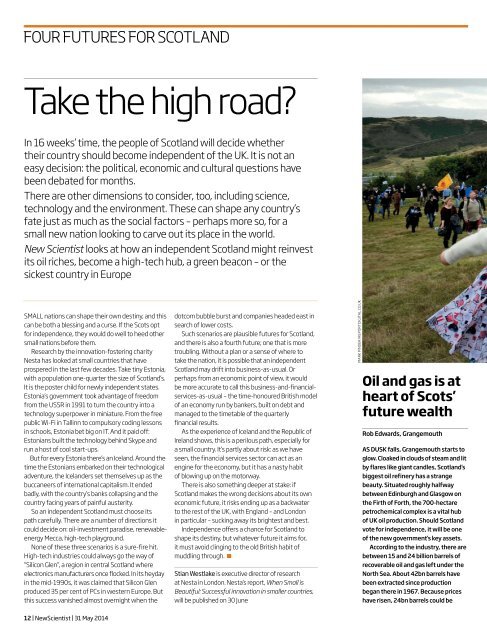New Scientist - 31 May 2014.bak
New Scientist - 31 May 2014.bak
New Scientist - 31 May 2014.bak
You also want an ePaper? Increase the reach of your titles
YUMPU automatically turns print PDFs into web optimized ePapers that Google loves.
FOUR FUTURES FOR SCOTLAND<br />
Take the high road<br />
In 16 weeks’ time, the people of Scotland will decide whether<br />
their country should become independent of the UK. It is not an<br />
easy decision: the political, economic and cultural questions have<br />
been debated for months.<br />
There are other dimensions to consider, too, including science,<br />
technology and the environment. These can shape any country’s<br />
fate just as much as the social factors – perhaps more so, for a<br />
small new nation looking to carve out its place in the world.<br />
<strong>New</strong> <strong>Scientist</strong> looks at how an independent Scotland might reinvest<br />
its oil riches, become a high-tech hub, a green beacon – or the<br />
sickest country in Europe<br />
SMALL nations can shape their own destiny, and this<br />
can be both a blessing and a curse. If the Scots opt<br />
for independence, they would do well to heed other<br />
small nations before them.<br />
Research by the innovation-fostering charity<br />
Nesta has looked at small countries that have<br />
prospered in the last few decades. Take tiny Estonia,<br />
with a population one-quarter the size of Scotland’s.<br />
It is the poster child for newly independent states.<br />
Estonia’s government took advantage of freedom<br />
from the USSR in 1991 to turn the country into a<br />
technology superpower in miniature. From the free<br />
public Wi-Fi in Tallinn to compulsory coding lessons<br />
in schools, Estonia bet big on IT. And it paid off:<br />
Estonians built the technology behind Skype and<br />
run a host of cool start-ups.<br />
But for every Estonia there’s an Iceland. Around the<br />
time the Estonians embarked on their technological<br />
adventure, the Icelanders set themselves up as the<br />
buccaneers of international capitalism. It ended<br />
badly, with the country’s banks collapsing and the<br />
country facing years of painful austerity.<br />
So an independent Scotland must choose its<br />
path carefully. There are a number of directions it<br />
could decide on: oil-investment paradise, renewableenergy<br />
Mecca, high-tech playground.<br />
None of these three scenarios is a sure-fire hit.<br />
High-tech industries could always go the way of<br />
“Silicon Glen”, a region in central Scotland where<br />
electronics manufacturers once flocked. In its heyday<br />
in the mid-1990s, it was claimed that Silicon Glen<br />
produced 35 per cent of PCs in western Europe. But<br />
this success vanished almost overnight when the<br />
dotcom bubble burst and companies headed east in<br />
search of lower costs.<br />
Such scenarios are plausible futures for Scotland,<br />
and there is also a fourth future; one that is more<br />
troubling. Without a plan or a sense of where to<br />
take the nation, it is possible that an independent<br />
Scotland may drift into business-as-usual. Or<br />
perhaps from an economic point of view, it would<br />
be more accurate to call this business-and-financialservices-as-usual<br />
– the time-honoured British model<br />
of an economy run by bankers, built on debt and<br />
managed to the timetable of the quarterly<br />
financial results.<br />
As the experience of Iceland and the Republic of<br />
Ireland shows, this is a perilous path, especially for<br />
a small country. It’s partly about risk: as we have<br />
seen, the financial services sector can act as an<br />
engine for the economy, but it has a nasty habit<br />
of blowing up on the motorway.<br />
There is also something deeper at stake: if<br />
Scotland makes the wrong decisions about its own<br />
economic future, it risks ending up as a backwater<br />
to the rest of the UK, with England – and London<br />
in particular – sucking away its brightest and best.<br />
Independence offers a chance for Scotland to<br />
shape its destiny, but whatever future it aims for,<br />
it must avoid clinging to the old British habit of<br />
muddling through. ■<br />
Stian Westlake is executive director of research<br />
at Nesta in London. Nesta’s report, When Small is<br />
Beautiful: Successful innovation in smaller countries,<br />
will be published on 30 June<br />
MARK PINDER/REPORTDIGITAL.CO.UK<br />
Oil and gas is at<br />
heart of Scots’<br />
future wealth<br />
Rob Edwards, Grangemouth<br />
AS DUSK falls, Grangemouth starts to<br />
glow. Cloaked in clouds of steam and lit<br />
by flares like giant candles, Scotland’s<br />
biggest oil refinery has a strange<br />
beauty. Situated roughly halfway<br />
between Edinburgh and Glasgow on<br />
the Firth of Forth, the 700-hectare<br />
petrochemical complex is a vital hub<br />
of UK oil production. Should Scotland<br />
vote for independence, it will be one<br />
of the new government’s key assets.<br />
According to the industry, there are<br />
between 15 and 24 billion barrels of<br />
recoverable oil and gas left under the<br />
North Sea. About 42bn barrels have<br />
been extracted since production<br />
began there in 1967. Because prices<br />
have risen, 24bn barrels could be<br />
12 | <strong>New</strong><strong>Scientist</strong> | <strong>31</strong> <strong>May</strong> 2014


